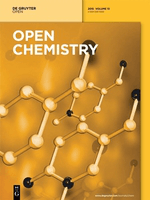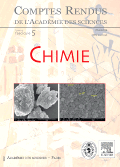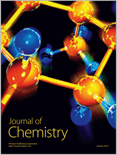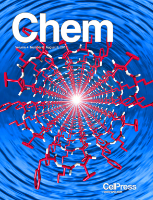
BMC Chemistry
Scope & Guideline
Exploring the Frontiers of Chemistry Research
Introduction
Aims and Scopes
- Sustainable Chemistry:
The journal highlights research that promotes sustainability in chemical processes, including green synthesis methods, eco-friendly analytical techniques, and the development of biodegradable materials. - Analytical Chemistry:
A significant focus on innovative analytical techniques, including high-performance liquid chromatography (HPLC), mass spectrometry, and spectrophotometric methods, is evident through various studies aimed at enhancing detection sensitivity and specificity. - Drug Development and Pharmacology:
Research articles often explore the synthesis and evaluation of new pharmaceutical compounds, including their potential therapeutic effects, mechanisms of action, and drug delivery systems. - Nanotechnology and Materials Science:
The journal features studies on the synthesis, characterization, and application of nanomaterials, including their use in drug delivery, environmental remediation, and as catalysts. - Computational and Theoretical Chemistry:
Many articles utilize computational methods, such as molecular docking and quantum chemical calculations, to predict the behavior of chemical compounds and assist in drug design.
Trending and Emerging
- Green Chemistry Innovations:
A significant increase in research focused on green chemistry practices, such as environmentally friendly synthesis and analytical methods, highlights a growing commitment to sustainability in chemical research. - Bioactive Natural Products:
There is a rising trend in the exploration of bioactive compounds derived from natural sources, emphasizing their potential therapeutic applications and health benefits. - Machine Learning and Computational Approaches:
The integration of machine learning and computational methods in chemical research is on the rise, facilitating advancements in drug discovery and material design. - Environmental Chemistry and Remediation:
Research addressing environmental issues, such as pollution remediation using innovative materials and methods, is becoming increasingly prominent, reflecting a global focus on environmental sustainability. - Drug Repurposing and Antiviral Research:
With the ongoing global health challenges, there is a notable increase in studies focused on drug repurposing and the development of antiviral agents, particularly in the context of COVID-19.
Declining or Waning
- Traditional Organic Synthesis:
There is a noticeable decrease in papers focusing solely on traditional organic synthesis techniques, as the field moves towards more sustainable and efficient methodologies. - Inorganics and Coordination Chemistry:
Research related to inorganic compounds and coordination complexes seems to be less prominent, possibly due to a growing interest in organic and hybrid materials. - Conventional Analytical Techniques:
Papers employing traditional analytical methods without a focus on sustainability or innovation are becoming less common, as researchers prioritize greener and more advanced techniques.
Similar Journals

JOURNAL OF THE INDIAN CHEMICAL SOCIETY
Showcasing the Evolution of Chemical Sciences since 1973Journal of the Indian Chemical Society, published by Elsevier, stands as a cornerstone in the field of chemistry, particularly representing the rich chemical research emanating from India.
With a significant history dating back to its establishment, this journal encompasses diverse disciplines including Drug Discovery, Electrochemistry, Inorganic Chemistry, Organic Chemistry, and Physical and Theoretical Chemistry, reflecting the evolving landscape of chemical sciences.
Despite being positioned in the Q3 category across multiple quarters, the journal demonstrates promising rankings in various chemistries, highlighting its commitment to advancing the knowledge and application of chemical sciences. While currently not available as an open access journal, the Journal of the Indian Chemical Society is dedicated to providing a platform for high-quality research that fosters innovation and collaboration among researchers, professionals, and students worldwide.
With its continuous publication from 1973 to the present, it serves as an essential repository for cutting-edge findings and developments in chemistry, striving to connect academia with industry and practice.

JOURNAL OF THE CHEMICAL SOCIETY OF PAKISTAN
Exploring Innovations in Chemical Research.JOURNAL OF THE CHEMICAL SOCIETY OF PAKISTAN is a premier academic journal published by the Chemical Society of Pakistan, focusing on advancing the field of chemistry through rigorous research and scholarship. Established in 1996, this journal aims to disseminate high-quality research articles, reviews, and insights pertaining to various subfields of chemistry, making substantial contributions to both local and international scientific communities. With a current impact factor placing it in the Q4 category, the journal continues to foster discussions on emerging trends and innovations within the discipline. Additionally, it holds a Scopus rank of #305 out of 408, highlighting its growing influence despite being positioned in the 25th percentile. Although it is not an open-access journal, it provides a crucial platform for researchers and professionals in Pakistan and worldwide. The JOURNAL OF THE CHEMICAL SOCIETY OF PAKISTAN serves as a valuable resource for students, educators, and industry professionals alike, facilitating the exchange of knowledge and promoting advancements in chemical sciences.

Open Chemistry
Connecting Researchers with Open Access ChemistryOpen Chemistry, published by DE GRUYTER POLAND SP Z O O, is a distinguished peer-reviewed journal that has been serving the global chemistry community since its inception. With an ISSN of 2391-5420 and an E-ISSN also of 2391-5420, this open-access journal has been accessible to researchers and practitioners alike since 2015, ensuring a wide dissemination of high-quality research findings. Located in Germany, specifically at BOGUMILA ZUGA 32A STR, 01-811 WARSAW, MAZOVIA, POLAND, Open Chemistry aims to publish innovative research across various chemical disciplines, with special attention to miscellaneous chemistry and materials chemistry. It is currently ranked in the Q3 category for both fields as of 2023, reflecting its solid standing within the academic community, with specific ranks of 187/408 in General Chemistry and 153/317 in Materials Chemistry, corresponding to respective percentiles of 54 and 51. Open Chemistry not only enhances the accessibility of cutting-edge research but also serves as a vital resource for students, professionals, and scholars seeking to advance their knowledge in the rapidly evolving landscape of chemical sciences.

Journal of the Iranian Chemical Society
Connecting Chemists to Drive InnovationThe Journal of the Iranian Chemical Society, published by SPRINGER, is a prominent academic journal dedicated to advancing the field of chemistry. With an ISSN of 1735-207X and an E-ISSN of 1735-2428, this quarterly journal has been contributing valuable research from 2006 to 2024. Situated in Germany, it serves as a vital platform for chemists and researchers to disseminate their findings, particularly within the miscellaneous chemistry category, where it ranks in the Q3 quartile for 2023. Despite its current lack of open access options, the journal maintains a solid presence in the academic community, evidenced by its Scopus ranking of #165 out of 408 in general chemistry and a commendable 59th percentile. The journal's objective aims to foster innovation and collaboration in chemical research, making it an essential resource for professionals and students keen on pioneering developments in the field. As a subscriber, you will gain insights into cutting-edge research that drives the future of chemistry.

COMPTES RENDUS CHIMIE
Pioneering Research Trends in Chemistry and Chemical Engineering.COMPTES RENDUS CHIMIE, published by the prestigious Académie des Sciences in France, stands as a significant journal in the fields of chemistry and chemical engineering. With an ISSN of 1631-0748 and an E-ISSN of 1878-1543, this open-access journal has been committed to disseminating high-quality research since its transition to open access in 2020. Featuring a diverse array of studies, the journal covers innovative research trends and applications, while maintaining a Q3 category ranking in both Chemical Engineering (miscellaneous) and Chemistry (miscellaneous) as of 2023. Its Scopus rankings, positioning at #251 out of 408 in general chemistry and #169 out of 273 in general chemical engineering, highlight its growing impact within the scientific community. Authored by a global cohort of scientists and researchers, COMPTES RENDUS CHIMIE is dedicated to the advancement of knowledge and sharing insights that are vital for ongoing research and development in the chemical sciences. Located in the heart of Paris at 23 Quai de Conti, 75006, France, the journal is an essential resource for those passionate about chemistry and engineering disciplines, fostering collaboration and innovation across the world.

Journal of Chemistry
Advancing the Frontiers of Chemical KnowledgeJournal of Chemistry, published by Hindawi Ltd, serves as a critical platform for advancing knowledge in the field of chemistry, particularly in its miscellaneous sub-disciplines. With an impressive 2023 Scopus Rank of #123 out of 408 and positioned in the Q2 quartile, this journal exemplifies a robust academic rigor that appeals to researchers, professionals, and students alike. It features articles related to innovative chemical research and developments, catering to a diverse audience eager to contribute to the growing body of literature in the chemical sciences. The journal has been operational from 2013 to 2024, and its Open Access model ensures that findings are easily accessible to a global audience, fostering collaboration and knowledge sharing. With a commitment to quality and relevance, the Journal of Chemistry continues to play a significant role in shaping contemporary chemical research and education.

Chem
Empowering Global Access to Chemical KnowledgeChem, published by CELL PRESS, is a renowned academic journal that has rapidly established itself as a leading platform for cutting-edge research in diverse areas such as biochemistry, chemical engineering, materials chemistry, and environmental chemistry. Released under the ISSN 2451-9294, this esteemed journal has achieved an impressive Q1 category ranking across multiple disciplines in 2023, highlighting its significant impact and prominence within the academic community. With a strong focus on innovative studies and interdisciplinary approaches, Chem fosters a vibrant dialogue among researchers, professionals, and students, making it an indispensable resource for those seeking to advance their knowledge and contribute to the evolving field of chemistry. As an open access journal, it aims to democratize knowledge, ensuring that critical research is accessible to a global audience. With its headquarters based in Cambridge, MA, it continues to lead the charge in the dissemination of pivotal findings that shape our understanding of chemical sciences.

Chemistry Africa-A Journal of the Tunisian Chemical Society
Fostering Innovation in African ChemistryChemistry Africa - A Journal of the Tunisian Chemical Society, published by SpringerNature, stands as a key platform for the dissemination of research in the dynamic fields of chemistry and its applications across Africa and beyond. With an ISSN of 2522-5758 and an E-ISSN of 2522-5766, this journal not only explores traditional chemistry topics but also delves into the intersections of catalysis, environmental chemistry, and physical theoretical chemistry, as reflected in its 2023 Scopus rankings, which place it in the Q3 quartile across multiple categories. Engaging researchers, professionals, and students, it aims to foster knowledge exchange and promote innovative solutions to contemporary challenges in chemistry. Although currently operating under traditional access, the journal's commitment to open scientific dialogue underlines its role in enhancing the visibility of African chemistry research. With been active since 2018 and set to converge through 2024, Chemistry Africa is vital for advancing regional and global scientific discourse.

Acta Chemica Iasi
Championing Excellence in Chemical ResearchActa Chemica Iasi is a distinguished open-access journal dedicated to advancing the field of chemistry, published by the esteemed ALEXANDRU IOAN CUZA UNIVERSITY PRESS located in Iasi, Romania. Since its inception, this journal has served as a vital platform for the dissemination of significant research findings, theoretical advancements, and methodological innovations in various chemistry disciplines. As an open-access publication since 2013, it provides unrestricted access to high-quality articles, fostering collaboration and knowledge sharing among researchers, professionals, and students globally. Although specific metrics such as H-Index and Scopus rankings may be forthcoming, the journal's commitment to rigor and excellence ensures that it remains an invaluable resource for those seeking to stay at the forefront of chemical research. With a focus on promoting scientific inquiry and innovation, Acta Chemica Iasi continues to uphold a legacy of scholarly excellence and contribution to the chemical sciences.

Nature Reviews Chemistry
Transforming Chemistry Through Critical AnalysisNature Reviews Chemistry is a premier journal published by NATURE PORTFOLIO, dedicated to advancing scholarly discourse in the broad field of chemistry. With an impressive impact factor and a ranking in the 99th percentile across its categories—ranked #2 in General Chemical Engineering and #4 in General Chemistry according to Scopus—this journal is recognized for its high-quality, peer-reviewed articles that synthesize and analyze the latest advancements in chemical research. Operating under a convergence framework from 2017 to 2024, Nature Reviews Chemistry aims to provide comprehensive insights and critical examinations of contemporary chemical practices, thereby reinforcing its status as a vital resource for researchers, professionals, and students alike. Although it is not an open-access journal, the breadth and authority of its content make it essential for those looking to stay at the forefront of chemical sciences.